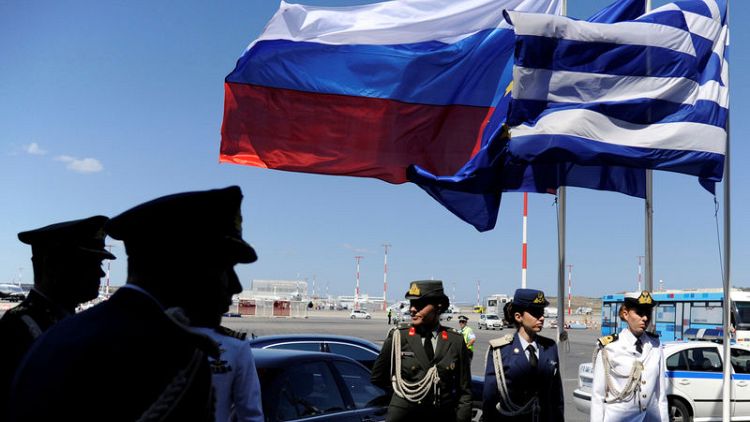By Michele Kambas and Denis Pinchuk
ATHENS/MOSCOW (Reuters) - Russia and Greece were poised on Wednesday to expel two of each other's diplomats in a rare dispute that Greek media said had been prompted by the issue of Macedonia, which expects this week to be formally invited to join the NATO alliance.
Athens will expel the two Russian diplomats and ban entry to two others on suspicion that they tried to undermine an accord clinched between Greece and neighbouring Macedonia last month, the Greek daily Kathimerini reported, citing diplomatic sources.
That deal - whereby Macedonia will become formally known as the Northern Republic of Macedonia - will unlock a formal invitation from NATO for the tiny ex-Yugoslav republic to join the bloc, a move strongly opposed by Moscow.
Russia's foreign ministry said it would respond in kind to the expulsions, Interfax news agency reported.
Greece and Russia share the Orthodox Christian religion and have traditionally had warm ties. Greece did not join most other NATO allies in March in withdrawing diplomats from Moscow over the poisoning of a former Russian spy in England. Britain blamed Russia for that incident. Moscow denied involvement.
Greece accused the Russian diplomats of activities inconsistent with their status, including illegal activities against national security, Kathimerini reported, adding that these had included attempts at bribery.
Asked about the report, Greek government spokesman Dimitris Tzanakopoulos told Skai TV: "The Greek government ... cannot tolerate behaviour which violates international law and which does not show respect to the Greek state."
"It is our assessment that there has been such behaviour, and for that precise reason all necessary measures will be taken," he added, without explicitly confirming the expulsions.
NATO EXPANSION
The Greek foreign ministry, contacted by Reuters, echoed the spokesman's statement and did not go further.
A member of Russia's upper house of parliament, Andrei Klimov, told RIA news agency that Moscow would expel two Greek diplomats in response to the Greek move, without mentioning Macedonia or giving further detail about the matter.
Moscow has long opposed the eastern expansion of NATO, regarding it as a direct threat to its own security. Many countries that were once in Moscow's orbit have joined NATO and the European Union since the fall of communism in 1989.
Macedonia expects to receive the invitation to join NATO at a two-day summit of the alliance that starts in Brussels on Wednesday, though it will only become a member if it adopts the new name agreed in principle with Greece.
Greece had long argued that Macedonia's name implies a territorial claim over its northern province of the same name, and had previously blocked its neighbour's attempts to join NATO. Macedonia will hold a referendum on the name deal.
Kathimerini said Greek authorities were investigating whether the Russian diplomats had meddled in Greece's internal affairs and quoted diplomatic sources as saying the suspicions were solely focussed on those four individuals.
"(This is) an amazing and highly significant development given close ties between Athens and Moscow," said James Ker-Lindsay, senior visiting fellow at the London School of Economics. "It is a clear warning not to abuse friendship. Extraordinary!" he tweeted.
Kathimerini said there was also growing unease in Athens over the increased influence of the Russian Orthodox Church at Mount Athos, an all-male monastic community in northern Greece.
(Additional reporting by Angeliki Koutantou; Editing by Gareth Jones)
